Iran's Handwoven Carpet Exports Plummet Amid Sanctions
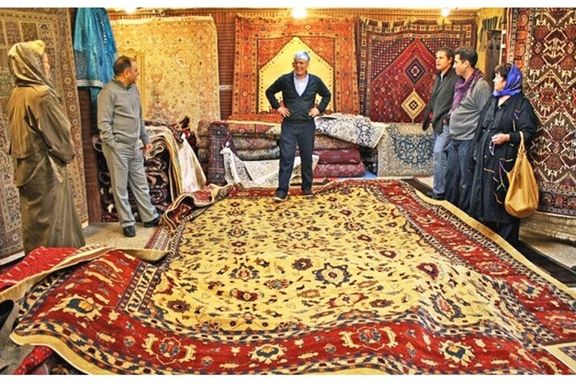
The Vice President of Iran’s Handwoven Carpet Producers Union has sounded alarm over the current state of Iran's carpet industry which is in rapid decline amid the country's recession.

The Vice President of Iran’s Handwoven Carpet Producers Union has sounded alarm over the current state of Iran's carpet industry which is in rapid decline amid the country's recession.
Speaking on behalf of the union, Hamed Chamran-Rokh disclosed that both domestic and international sales of handwoven carpets are continuing to decline.
"In the current circumstances, handwoven carpet exports are practically zero," stated Chamran-Rokh, exacerbated by the imposition of banking sanctions.
Last year, exports of one of Iran’s most famous products, hit its lowest levels in 24 years, a 24 percent decrease in one year alone.
The decline in Iran's handwoven carpet exports marks a stark contrast to its historical performance. In 1994, Persian carpets generated over two billion dollars in revenue for the country. However, by 2019, the figure plummeted to a mere $69 million. The situation worsened in the second quarter of 2020, with exports bringing in only two million dollars.
Numerous factors contribute to the significant drop, including challenges in global logistics chains, the escalating cost of products. International sanctions related to Tehran’s nuclear program have also dealt a blow to local industries, including the handwoven carpet sector.
Beyond economic implications, the decline in handwoven carpet exports carries profound social repercussions. Carpets have long been a cornerstone of Iran's rural economy, offering vital employment opportunities for millions of families.
However, as business dwindles, statistics from the Ministry of Industry, Mine, and Trade reveal that approximately two million weavers have been compelled to migrate to cities or neighboring countries in search of alternative livelihoods.
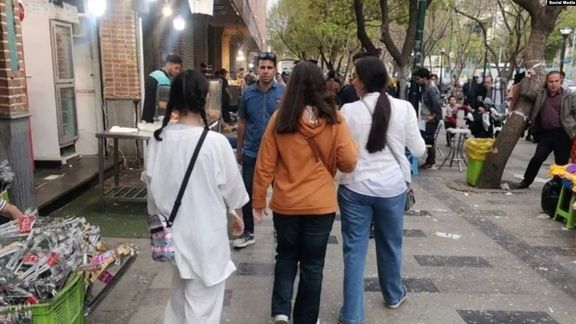
A political commentor in Iran has warned of heightened social tensions on the eve of the Iranian parliament's next review of a new and more hardline hijab law.
Ahmad Zeidabadi said, "This year is full of challenges... From fundamental and vital issues such as water scarcity, land subsidence, and environmental degradation, to economic issues, wage levels, continued recession and inflation, and social issues such as polarization over mandatory hijab and its potential for social tensions."
His warnings come amid heated debates over a proposed bill aimed at even stricter enforcement of compulsory hijab laws. Public outrage ignited since the death in morality-police custody of Mahsa Amini in 2022, has intensified opposition to the mandatory Islamic dress code. It has seen the biggest uprising since the founding of the Islamic Republic, branded the Women, Life, Freedom movement.
In response to mounting public resistance, the clerical regime has resorted to various measures to enforce hijab laws, ranging from public humiliation tactics to the use of traffic cameras for identification.
If passed, various penalties of the "Protection of Family Through Promotion of Hijab and Chastity Culture" bill include heavy cash fines for women who do not abide by the prescribed dress code consisting of a headscarf covering all hair and the shoulders, a loose long tunic with long sleeves, and trousers that cover the legs to below the ankles.
However, Zeidabadi reiterated warning by many others, including some clerics, that such heavy-handed approaches risk further alienating the populace. He emphasized that addressing such issues requires a fundamental shift in political perspectives, both domestically and internationally.
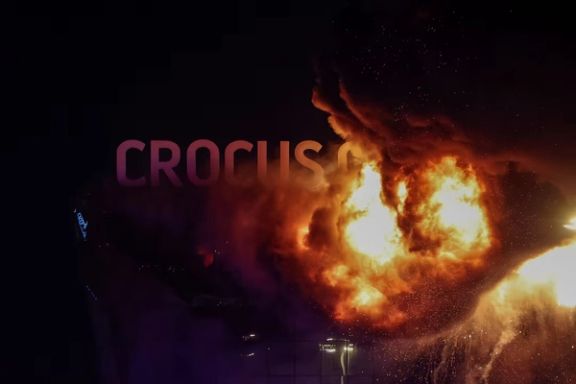
Prior to the Moscow concert hall massacre last month, Iran had warned its ally Russia about the imminent terror attack, according to Reuters.
At least 144 people were killed in the attack claimed by Islamic State, which saw gunmen open fire at the Crocus City Hall.
Days before the shootings in the Russian capital, Tehran had allegedly sent warnings to Moscow, through intelligence gleaned from interviews with Islamic State terrorists connected to the deadly twin bombings in Iran in January.
After the terror attacks that killed around 100 in Kerman, Iran claimed to have arrested 35 people, including a commander of Islamic State's Afghanistan-based branch ISIS-Khorasan (ISIS-K), which claimed responsibility for the Iran attacks, the worst since the founding of the Islamic Republic.
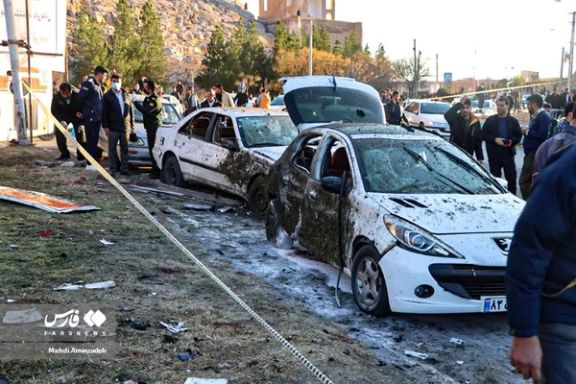
Another source told Reuters that Tehran had failed to provide specific intelligence to Moscow such as the location and timing of the attack, though warned that members of ISIS-K had already travelled to Russia, failing to foil the deadly shootings.
However, both Iran and Russia, vehement foes of the US had ignored warnings from Washington of the imminent terror attacks. Moscow was warned three days before the Friday night massacre and Iran more than a week before the Kerman attacks.
Relations between Iran and Russia have deepened since the war in Ukraine, in which Iran has provided drones used in Russia’s offensives. The two sanctioned nations have also become key financial allies as they skirt global crackdowns.
Security and intelligence ties continue to deepen between the two pariah states. In July, Iran and Russia signed a new cooperation agreement to expand bilateral security and law enforcement cooperation, inked between Iran’s police chief, Ahmad Reza Radan, and the head of Russia’s national guard, Viktor Zolotov.
Then in December, Iran's parliament approved a bill aimed at fostering cooperation with Russia in the realm of information security. Comprising nine articles, the bill focuses on combating cyber threats, fortifying information security measures, and fostering collaboration between Iran and Russia. A key clause in the legislation addresses the exchange of information and cooperation in prosecuting criminal offenses between the two nations. Military drills between the two nations and their ally China have also been happening with increasing frequency.
The attack was a huge blow to the Kremlin, known for its high-level network of intelligence at home and abroad. Both the attacks in Iran’s Kerman and Moscow involved Tajik nationals, ISIS-K having aggressively recruited from the impoverished former Soviet republic of in recent years. While Islamic State has been largely defeated in Iraq and Syria, ISIS-K remains strong, covering Iran, Turkmenistan and Afghanistan.
Reuters also claims that the issue has been discussed between Iran and Tajikistan in a bid to halt the militant activities against Iran’s Shi’ites, hated by Islamic State’s Sunni-following Islamists.
While in 2022 Islamic State claimed responsibility for a deadly attack on a Shi'ite shrine in Iran that killed 13 people, also carried out by a Tajik national, the Moscow attack came as a shock. Islamic State also carried out twin bombings in 2017 that targeted Iran's parliament and the tomb of the Islamic Republic's founder, Ayatollah Ruhollah Khomeini.
Iran's foreign ministry and the Kremlin did not reply to a request for comment on the latest revelations in the Reuters story and Russia has instead continued to blame Ukraine for the attack in spite of the admission by ISIS-K.
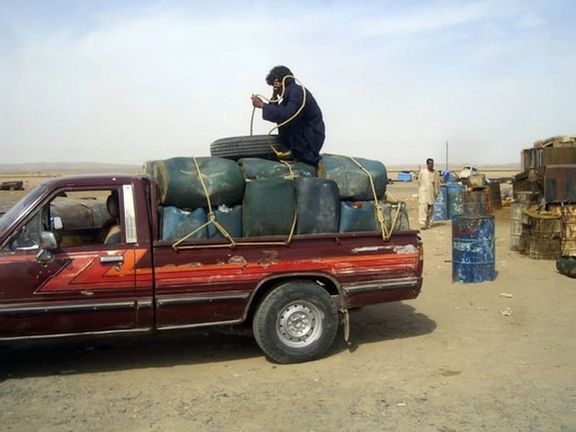
A total of 27 fuel smugglers died in 10 days during Norouz with a further 18 seriously injured as citizens risked their lives in Sistan and Baluchestan, one of Iran's poorest provinces.
Between March 20 and 30, according to the Halvash the deaths included shootings by security forces, road accidents and vehicle fires.
The victims were between 18 and 28 years old, the latest in a string of deaths since last year among the country's economic crisis where more people try to smuggle small amounts of fuel by pick-up trucks to neighboring counties, foremost to Pakistan.
Halvash claims that during 2023, at least 172 Baluch fuel smugglers died, 42 others reported injured during the same period.
Activists and human rights media have pointed to deliberate deprivation and discriminatory policies by the government toward minority dominated provinces like Sistan and Baluchestan, as well as Kurdistan, as contributing factors to the proliferation of fuel smuggling activities.
With a lack of job opportunities and government negligence to the poverty-stricken Sistan and Baluchestan region play a significant role in pushing Baluch citizens towards engaging in fuel smuggling. Selling to Pakistan has become a means of earning a meager income for the population in the border region, earning a higher price across the border than at home.
For years, rights groups such as Amnesty International have reported on the use of lethal force against unarmed fuel porers in the region.
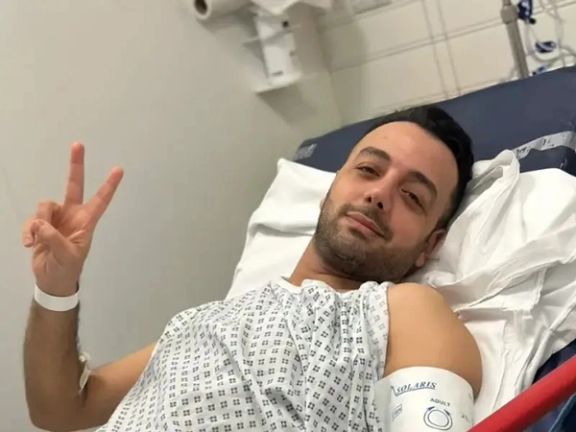
The president of Norway’s parliament has extended wishes of support to Pouria Zeraati, the Iran International journalist who was stabbed in London by unknown individuals.
Masud Gharahkhani, an Iranian-born lawmaker, took to social media to express his support for Zeraati, describing him as a "skillful and courageous journalist."
He shared a photo of himself with Zeraati and wished him a speedy recovery, expressing hope that Zeraati would “continue to give a voice to all the young people fighting for freedom and democracy in Iran.”
Zeraati was discharged from the hospital on Sunday after sustaining injuries to his leg during the attack outside his London home on Friday afternoon.
According to eyewitnesses cited by The Standard newspaper, two young men stabbed the journalist multiple times before fleeing the scene.
The motive behind the attack remains unclear, but it comes amid heightened tensions following the revelation of a plot by the Iranian regime to assassinate two other Iran International journalists.
London's Metropolitan Police have launched an investigation into the incident, acknowledging Zeraati's profession as a reporter for a Persian-language media outlet based in Britain amid multiple death threats to Iranians living In the UK.
Given the numerous threats against Iran International journalists since the 2022 uprising began, including the recent assassination plot, the attack on Zeraati is being treated with utmost seriousness. Specialist counter-terrorism officers are leading the inquiry.
In response to the attack, several political figures and civil activists, including Masih Alinejad, Shirin Ebadi, and Alireza Akhondi, have condemned the assault on Zeraati, emphasizing the importance of press freedom and the safety of journalists worldwide.
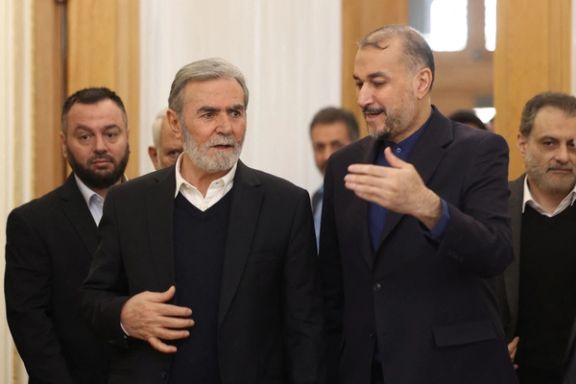
The leaders of Hamas and Islamic Jihad visited Iran last week, attesting to the Tehran's growing influence on Palestinian politics, almost six months after the October 7th attack on Israel.
Ismail Haniyeh, the head of the Hamas political bureau and Ziyad al-Nakhalah, the Secretary-General of the Islamic Jihad Movement in Palestine, met with the highest ranking officials in Iran, enjoying such pomp and circumstance as is reserved for heads of state.
And they were courteous enough to reciprocate with exclusive praise for the Iranian regime.
“Iran stands at the forefront of supporting the cause and people of Palestine,” Haniyeh said. “I extend special thanks to the Supreme Leader of the Islamic Revolution of Iran, the President of Iran, and the people of Iran.”
Nakhalah went even further. “Active diplomacy by the Islamic Republic of Iran has had a great role in defining the stance of Palestinian resistance,” he was quoted as saying by the Iranian government's official news agency IRNA.
Iran has so far avoided direct conflict with Israel, although it has unleashed it armed proxy forces in the region to attack Israel and international shipping. But it has had a major role in shaping and prolonging the war, not least by providing money and weapons and training to Hamas and Islamic Jihad, whose gains in Palestinian politics invariably means a loss for the Palestinian Authority (PA) and its president, Mahmoud Abbas.
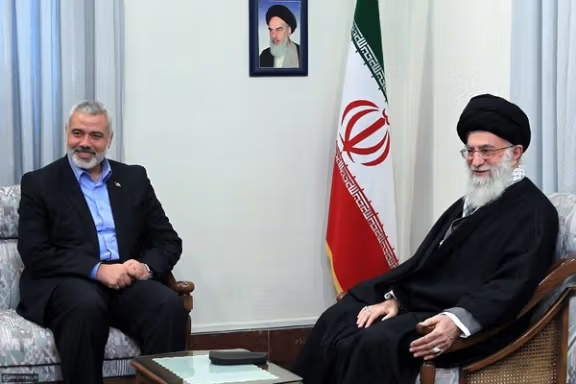
At 88, Abbas is far from an inspiring –or at least, authoritative– leader who would be able unite Palestinian factions. He is old and rather feeble. Allegations of corruption and secret security dealings with Israelis have dented his reputation among ordinary Palestinians, even in the West Bank where his Fatah movement rules.
The regime in Tehran knows this, and does everything it can to tilt the balance of power among Palestinian factions away from the Palestinian Authority and towards Hamas and Islamic Jihad, whom, unlike Fatah, Iran considers friends and allies.
The two Palestinian leaders even had a bilateral meeting in Tehran, of which no meaningful detail has emerged. It is hard to imagine that Haniyeh and al-Nakhalah could not have found other opportunities to coordinate their attacks against Israel. Their meeting in Tehran –choreographed and publicized by the hosts as a major event– may be better understood as a show of stature for the Iranian regime rather than a decisive occasion for the two parties involved.
This may also be true with regards to the timing of the visits. To host the leaders of Hamas and Islamic Jihad in the Muslim holy month of Ramadan, just before the Iran-initiated International Quds Day, seems like yet another effort by the Iranian regime to underline its position as the one pulling the strings.
Quds Day, coined by the founder of the Islamic Republic, Ruhollah Khomeini, in 1979, is the last Friday of Ramadan. Muslims of the world are invited to come together on that day in solidarity with Palestinians and in protests against Israel, holding rallies and marching after the Muslim Friday prayer in cities worldwide.
It is by definition an occasion to remember the Palestinian ‘cause’. But this year, it seems to be about showcasing Iran's Islamic regime's leadership and righteousness for 45 years, but at least as much as it is about supporting the Palestinian people.
But the visits came also at a time when Israel is threatening to go all the way in its attack on Hamas in Gaza. A full defeat for the Islamist group would be a great setback for Iran that has invested more than two decades of support to make life harder for Israel.
“The Islamic Republic of Iran will not hesitate in supporting the cause of Palestine and the oppressed and resilient people of Gaza," Iran’s Supreme Leader Ali Khamenei said during his meeting with Haniyeh last week.
What he did not say was that the “cause of Palestine” is yet another means, albeit a potent one, towards the ultimate cause: advancing the interests of Iran’s ruling regime to the detriment of ordinary men, women and children in Iran and beyond.